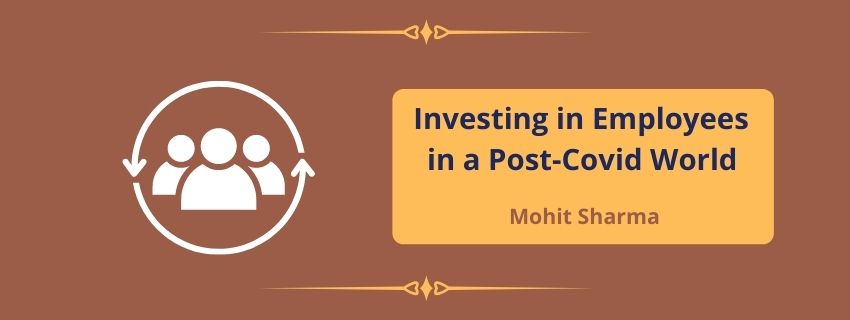
Investing in Employees in a Post-Covid World
Mohit Sharma
(2021-01-10)
One of the most positive recent changes with organisations is the willingness to invest in employees and, undoubtedly, this intent is much higher than it has ever been. It took a global health crisis for organisations and their leaders to get re-aligned with an understanding of investing in their employees. The new working dynamics of “WFH” (Work From Home) proved that lot of things considered to be important earlier are just no longer needed - activities like micromanagement of employees, unnecessary meetings at work, paper-based approvals, and even many official documents like appointment letters, etc. Technology has already pushed organisations to bring in this change and to accept it much faster than it would have been in an ideal scenario. There are a number of factors that need to be considered or questions that need to be asked like the below -
- Organisations are relooking at defining roles, titles, job locations, budgets and many other issues collectively once again to plan for effective post-COVID workplaces. However, many organisations are not yet prepared to deal with one more change that is coming, as we resume back to normal- This change is underplaying currently due to low market sentiments and the VUCA nature of the market.
- Considering that separations are no longer a mere reduction in the organisation head count but make an impact to the knowledge, culture, process, competence, and skill inventory of the organisations as well, COVID will make organisations professionally vulnerable as well. Particularly now, when we have realised that location is not a constraint for employers to identify suitable talent for them, are we ready for a fiercer talent war than ever before?
- Is your organisation ready for the time when things are back to normal and the requirement for skilled manpower will be higher than usual? Do you have enough skilled people already at the right place and are also sure about their continuity in the organisation as well?
- Lot of these questions are in front of us already, and organisations need to accept the fact that this vulnerability may lead to an additional attrition as well, in the times to come. Yes, it gives organisations an additional advantage to identify local talent pool as well, but the war for talent is very much likely to get interesting.
- Apart from an apparent attrition issue, which we can address little later in this article, let us point towards another important aspect that needs our attention and is impacting organisations. Are we losing / going to lose talent due to a skill or a will issue? Are employees in your organisation well engaged, skilled, re-skilled, up-skilled regularly because at the current rate of disruption, many skills will become redundant in next five years and others will be taken over by the technology. Another major concern for some of the organisations is working with a demotivated, non-engaged and a non-aligned employee. Do we have adequate tools, technology, metrics and data points to define this explicitly for an organisation?
Let us evaluate both the above aspects. Working with employees not as competent as the role demands may be a comparatively easier way (because of the efforts that a replacement effort would demand and the entire transition phase with onboarding and off boarding of an employee). On the other hand, working with a dissatisfied employee can impact the organisation culture and can prove to be detrimental to the organisation. Which one of the two more critical for your organisation, this is something I leave for you to decide as there are many underlining factors that would contribute to the outcome of this, both, internally and externally.
Coming back to the change - this pandemic is exposing us gradually to new market trends and the ever-changing work environment. We need to focus more on employee experience and engaging talent with a complete understanding of what our talent needs. We all are driven by different needs and that homework is now more important than ever, when it comes to dealing with people.
Organisations now need to redefine their parameters of evaluation and would need strong people managers to understand talent with a comprehensive point of view and align strategies accordingly. Critical aspects like work location, flexi work timings, rewards and recognition and evaluating performance would need fresh perspectives as the current methods may not remain relevant in the post-pandemic environment. The sooner people leaders are able to understand this change, the better we can focus and align our talent efforts to ensure that the competition is not giving you a hard time. Very importantly, do not forget to miss out the human element when dealing with humans working in your organisation and lead them effectively.
Wish you all luck!!